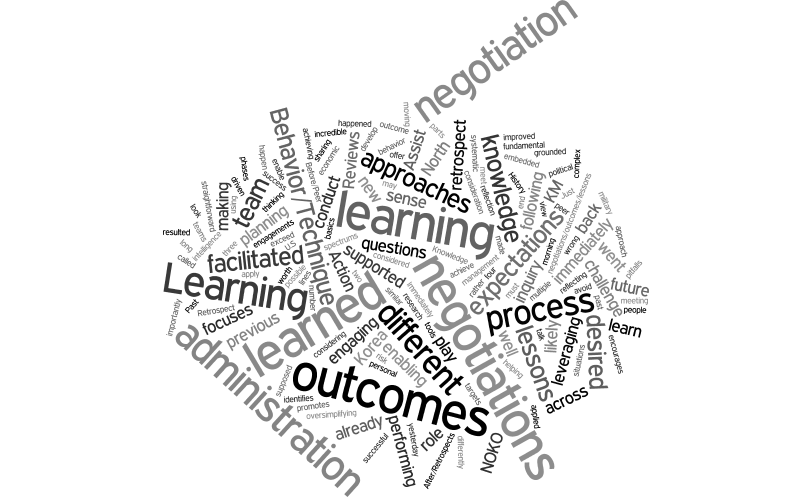
History is in the making regardless of the outcomes…and knowledge management can have a critical role to play in enabling the US to “create value from its knowledge” and achieve the desired outcomes.
Two questions to consider:
- How can KM play a role in enabling outcomes to meet or exceed negotiation expectations?
- How is the Trump administration leveraging the multi-dimensional lessons learned that resulted from negotiations across previous US administrations?
Past negotiations have a history of outcomes being different from expectations in engaging with North Korea. At the risk of oversimplifying an approach to what are complex talks with an incredible number of moving parts across multiple spectrums (political, economic, military, intelligence, social, personal, other), I offer the following
“back to basics” consideration (if not already considered) … engaging using learning before, learning during, and learning after behavior techniques and tools to improve the desired outcomes as a fundamental part of the planning and conduct of the negotiations. This will likely be a long process.
- Behavior/Technique – Learning Before/Peer Assist): “Learning before doing” is supported through the Peer Assist, a facilitated process which targets a specific challenge, imports knowledge from people outside the team, identifies possible approaches and new lines of inquiry, and promotes sharing of learning with each other through a facilitated meeting. How is the administration leveraging past administration negotiations/outcomes/lessons learned to develop and vet a new negotiation strategy that is improved through this peer interaction and lessons learned research and sense making?
- Behavior/Technique – Learning During /After Action Reviews: A U.S. Army technique, After Action Reviews enable the to “learn while doing” by answering four questions immediately after each negotiation day: (1) What was supposed to happen? (2) What happened? (3) If different from expectations, why are they different? and (4) What can we learn and immediately apply?
- Behavior/Technique – Learning After/Retrospects “Learning after Doing” is supported by a facilitated process called a Retrospect. Immediately after the end of the negotiations or negotiation phases, conduct a retrospect. This encourages team members to look back at the negotiations to discover what went well and why and what could have been done differently, with a view to helping a different team repeat their success and avoid any pitfalls— “learning after doing.” The retrospect focuses not on what went wrong and who did it, rather it focuses on what was learned and how this can be applied in future situations by future teams, so they will be successful. It is a “process of inquiry, not inquisition.” What has been learned from previous negotiations and engagements with NOKO and more importantly what sense has been made from the lessons learned?
To be effective, these three processes for “systematic reflection” must be embedded in the negotiation planning and execution. It is outcome driven and is grounded in “performing and learning and performing.”
Could achieving the outcomes desired be this straightforward? Not likely. And again, the administration may very well be following similar approaches. I was thinking about this listening to the Sunday morning talk shows yesterday and reflecting on how the administration approaches challenge. Just saying….it is worth considering if not already.

